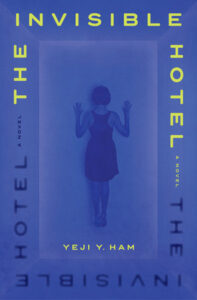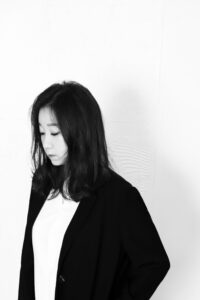Ghosts of the Korean divide
The Invisible Hotel
by Yeji Y. Ham
Toronto: Bond Street Books, 2024
$34.00 / 9780385698054
Reviewed by Daniel Gawthrop
*

If you’ve never heard of Yeji Y. Ham, that’s about to change in a hurry.
This young Korean Canadian writer, a UBC Creative Writing grad and Brown University MFA who divides her time between Vancouver and Seoul, has written a first novel that—on its own merits, and with the heft of a major publisher’s publicity machine behind it—should easily find a place on North American literary prize longlists.
Ham’s publisher bills The Invisible Hotel as gothic horror, but it’s more than that. Set in rural South Korea and Seoul (and on the lonely motorways in between, where everything seems to be within a two-hour radius of the North Korean border), this novel also works as a family memoir, coming-of-age journey, and even political thriller. But yes, it is speculative fiction that employs several aspects of the horror genre.
The story centres on a first-person narrator, Yewon. This emotionally shut down young woman feels trapped in Dalbit, an unmemorable village. She’s mourning her father, who died the previous year, and worries about her brother Jae-hyun, a soldier posted near the border.
Yewon’s also frustrated with her mother. The woman has constant anxiety about her children. In particular, there’s her eldest (Yewon refers to her only as “Sister”), who hasn’t confided that she’s divorcing her husband Eun-woo and moving to Seoul.
In the midst of all this, Yewon loses her minimum wage job at a convenience store after agreeing, for a fee, to take a distraught elderly woman on a two-hour drive toward the border. The novel opens with the first awkward meeting between Yewon and Ms. Han, during a break at the store, where Yewon agrees to the job. Only then does Yewon learn that Ms. Han is North Korean, and that she’ll be driving her to a prison near the border to visit a brother she hasn’t seen in 68 years.

Ham’s concrete style—short, brisk sentences emphasizing physical detail—establishes a sense of claustrophobia, paranoia, and impotence throughout the narrative. The human impacts of the seventy year separation of North and South Korea are seen from the micro (the generational trauma of Ms. Ham’s lost relatives, the concern for Jae-hyun’s well-being as a soldier) to the macro (the threat of nuclear annihilation—ever-present and constantly in the news, with Kim Jong-un’s every long-range missile test regarded as a possible trigger for the apocalypse).
In Yewon’s view, Dalbit is little more than “a stretch of paddy fields and a scatter of houses” where there isn’t much to see: “Dalbit was like any other village. Surrounded by trees and mountains which wore the four seasons. Plots of land to plant, weed, harvest. Houses to grow in, then move out of. Dalbit was tended by aging hands.”
Influenced by her best friend Min, the solution for Yewon is always to leave Dalbit and go to Seoul—whether to move into a small apartment with Min, or another place with Sister—or, to travel to Australia for more education. But various challenges paralyze her from deciding either way: from the usual affordability woes facing every working student, to a sense of obligation to her mother and ongoing depression as she grieves her father. She pays for this indecision with Jae-hyun, who at one point accuses Yewon of lacking initiative. “You never do anything but watch,” he tells her in a drunken moment of honesty.
Throughout the story, as Ham develops the relationship dynamics between characters, she takes us deeper into Yewon’s consciousness, exposing an alternate universe that grimly captures both her anxieties and the horrors that trigger them.
Her mother is constantly in the bathroom, obsessively washing bones in the tub (her late husband’s bones?), nauseating her daughters with the stench no matter how often she soaps, scrubs, and rinses them. An old man is often seen outside, banging on different doors and trying to get in; later, he appears with doors strapped to his back. A woman is seen hanging windows on a clothesline.
The first reference to the hotel of the title occurs nearly a third of the way in, when Yewon sees an empty key rack that covers an entire wall. It’s a lobby, the front desk of a hotel:
I was a guest. Traveling far from home, come to a foreign place. A stranger to where I arrived. Though I don’t remember coming to a hotel or traveling at all. I don’t want a room. I need to get out. I lean over the countertop, looking for a telephone, a doorbell, any signs of operation.
Ham frequently blurs the distinction between Yewon’s dream state and her waking reality, but readers know what the author is up to. The old man with the doors and the woman with the windows, the references to keys (and finding a way out), the washing of bones in bathtubs (or babies born in them): they’re all expressions of the burdens Koreans continue to face on both sides of the border.
During the driving scenes—Yewon takes Ms. Han to the prison three times, the final trip also includes her son’s daughter—the air is almost stifling as the two women struggle to understand each other. When Yewon asks Ms. Han what it’s like in Pyongyang, she says she wouldn’t know as she’s never been to North Korea’s capital. “In the North, you can’t leave your hometown without a special permit,” Ms. Han explains, “You die where you are born.”
Ham’s writing is tactile and sensual, poetically so in places, filled with tastes and smells. There are several passages about food, with Yewon and Min often gorging themselves to the point of exhaustion. Ms. Han, by contrast, brings carefully prepared boxed lunches to share with her son and her driver, food being a precious commodity. The paradox hasn’t escaped Hotel’s narrator: “Two hours from here, Ms. Han said, was North Korea, where millions of people were dying of starvation. Two hours away, and three thousand tons of food waste.”
There are comical effects, to be sure. Min’s friends, utterly clueless about the current situation in the North, assume (based on rumour) that living conditions have improved. Once bored of the subject, they order more food. One night, Yewon joins Min and her friends at a club and gets outrageously drunk—perhaps the only way she can relax enough to let her guard down with a possible love interest, Tae-kwun, who is exceedingly gallant in befriending her.
Ham’s mastery of the surreal is one of this novel’s greatest strengths. In one memorable scene, Yewon is covering for the absent Min on her job at a museum when World War III appears to break out. It’s an historical exhibition of the decades in Korea since partition, arranged in a giant set. The sound system hasn’t been working lately, but suddenly bombs are exploding, bullets firing, and air raid sirens blaring through the room, and send the crowd into a The War of the Worlds-type panic and frenzy. The revelation of what really occurred—“I’m so sorry for the inconvenience,” says a museum spokesperson—is darkly hilarious.
At turns beautiful and disturbing, The Invisible Hotel is a haunting exploration of our regrets about the things left unspoken with loved ones—and how we fill absences in our lives. A novel that’s hard to put down, it’s sure to linger once finished.
*

Daniel Gawthrop‘s debut novel, Double Karma, was published in 2023 by Cormorant Books. He’s also the author of five nonfiction titles, including The Rice Queen Diaries, a memoir about interracial attraction. Visit his website here. [Editor’s note: Daniel Gawthrop has reviewed Chad Soon and George Chiang, Hirsch and Cheryl A. MacDonald and Jonathon R.J. Edwards (editors), Valerie Jerome, Niloufar-Lily Soltani, Brett Popplewell, Alex Kazemi, Charlotte Gill, and Eden Robinson for BCR.]
*
The British Columbia Review
Interim Editors, 2023-25: Trevor Marc Hughes (nonfiction), Brett Josef Grubisic (fiction)
Publisher: Richard Mackie
Formerly The Ormsby Review, The British Columbia Review is an on-line book review and journal service for BC writers and readers. The Advisory Board now consists of Jean Barman, Wade Davis, Robin Fisher, Barry Gough, Hugh Johnston, Kathy Mezei, Patricia Roy, Maria Tippett, and Graeme Wynn. Provincial Government Patron (since September 2018): Creative BC. Honorary Patron: Yosef Wosk. Scholarly Patron: SFU Graduate Liberal Studies. The British Columbia Review was founded in 2016 by Richard Mackie and Alan Twigg.
“Only connect.” – E.M. Forster
One comment on “Ghosts of the Korean divide”